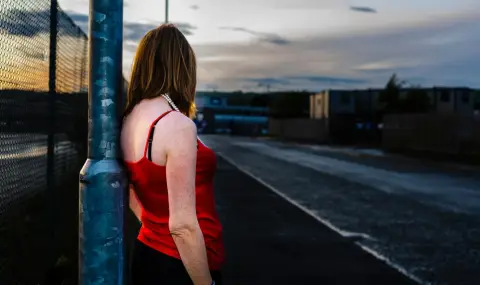Author: Margarita Nikolova
At 19, Maria* involuntarily falls into the trap of sexual exploitation. She leaves for Greece with the idea of becoming an egg donor. “They told me I would donate eggs, but they made me a prostitute“, the victim tells DV.
A year later, Maria finds herself in a Western European country, where she is once again forced to sell her body. Her pimp is a close relative. “If I made him a little money, he would start beating me. "If I paid him more, he would beat me again," says the young woman, lifting the sleeve of her T-shirt to show the still visible scars of violence.
After two years of forced prostitution, mental and physical abuse, Maria mustered the courage to escape. A social worker came to her aid and she filed a complaint with the police. As a result, the young woman was sheltered in a crisis center and later returned to Bulgaria.
From fake ads to slavery: The new methods of traffickers
„Unfortunately, we lead the charts. In terms of human trafficking, Bulgaria is a country of origin, meaning people are recruited and taken abroad for exploitation," explains Monika Nikolova, head of the Bulgarian office of the international NGO A21, whose field of activity is the fight against human trafficking, to DV.
The most popular types of exploitation are labor and sexual, with traffickers often managing to attract their victims through tempting job advertisements, which later turn out to be false. "Many years ago, it was known that they used very harsh methods - kidnapping, physical violence in the initial phase. Now traffickers use softer methods. The truth is that access to social networks and the online space makes it easier for traffickers to reach us," says Nikolova.
She adds that in recent years, Bulgaria has also become a destination country for citizens from poorer countries who are looking for legal work. However, upon arrival, they fall into a vicious circle - their documents are taken away, their free movement is restricted, they do not receive the promised pay, they work more than agreed, and sometimes they become the object of violence.
A21 Foundation saves people from invisible slavery
“In the 21st century, nearly 50 million people are victims of trafficking - that's 50 million slaves. 1% of them will ever be saved“, notes Monika Nikolova. One of the main areas on which the foundation's work is focused is precisely the rescue of victims.
A21 manages the National Hotline for Combating Human Trafficking (0800 20 100). “We receive a variety of signals on the hotline. It works 24/7 and is completely anonymous. Citizens and victims can call if they are in Europe“, explains Nikolova. The hotline also serves as a tool for directing victims of trafficking to a number of services such as crisis accommodation, legal and medical assistance, social and therapeutic activities.
A similar type of service is also offered by the Foundation's Day Center in Sofia, which enables rescued victims of sexual exploitation to acquire various skills for the purpose of recovery and safe reintegration into society. “The trauma is deep – especially in sexual exploitation, especially if the victim has been exploited for a longer period of time. There, the traumas are complex, there are also health problems. It takes a long time to recover“, explains the director of A21.
For Maria, the Day Center is a safe place. There she attends a psychologist and various courses for functional literacy. With the help of the foundation, she also managed to find a job in a candle and ceramic studio, and the products themselves are then sold at bazaars for charity. The young woman says that the work satisfies her and makes her feel calm because she helps other people in need. "It's better for me because I work and earn money with honest labor - I don't sell my body," adds Maria.
The A21 Foundation also deals with prevention through various information campaigns to raise public attention to this often marginalized problem. "We have many resources through which people can understand how to protect themselves and their loved ones. Children are actually very vulnerable to being exploited online. We also do many presentations in schools and universities," says Monika Nikolova.
The legal fight against traffickers and the challenges facing their victims
When it comes to cross-border human trafficking, cases against traffickers are conducted in the country of exploitation. This is the case of Maria. “They wanted to stop the case last year, but they couldn't because I appealed. There wasn't that much evidence. I have medical records from both abroad and Bulgaria“, says the disappointed victim. She recently had to give testimony again.
According to Monika Nikolova, it is the victim's testimony that is key in legal proceedings. “If they were in a romantic relationship, the victim may initially say that she was exploited. At some point, however, she may get scared and change her testimony, making it more difficult to prove that the person is a trafficker and exploited her“, explains Nikolova.
Between court decisions and efforts to recover from the trauma experienced, as well as to reintegration into society, victims of trafficking often rely on the hope of justice. For Maria, giving up on seeking her rights is simply not an option: “I want him to be sentenced to life and other girls not to go through the same thing as me. If they do go through this, let them have the courage to stand up to their abusers.”
The national hotline for combating human trafficking is 0800 20 100.
*For security reasons, the name of the victim of sexual exploitation in the text has been changed.
